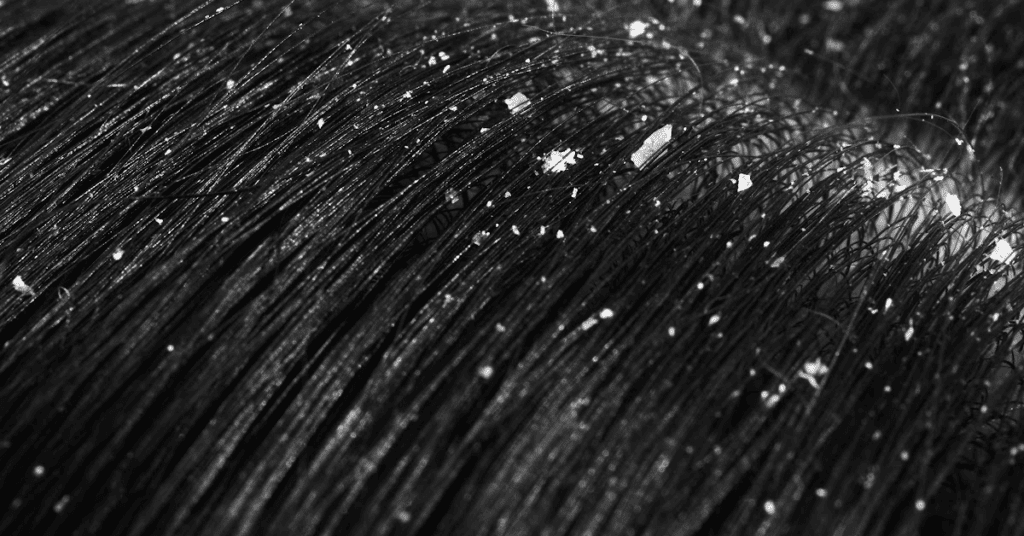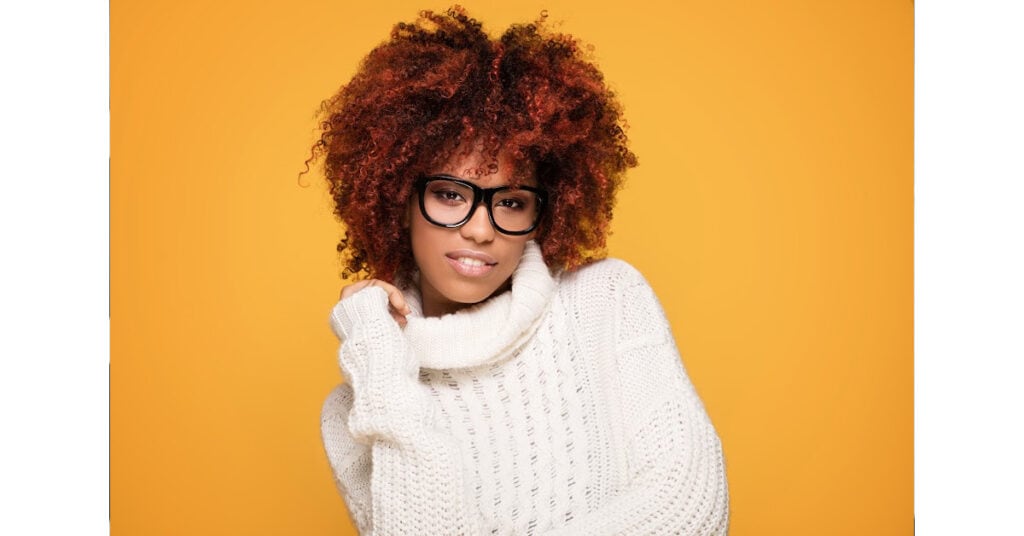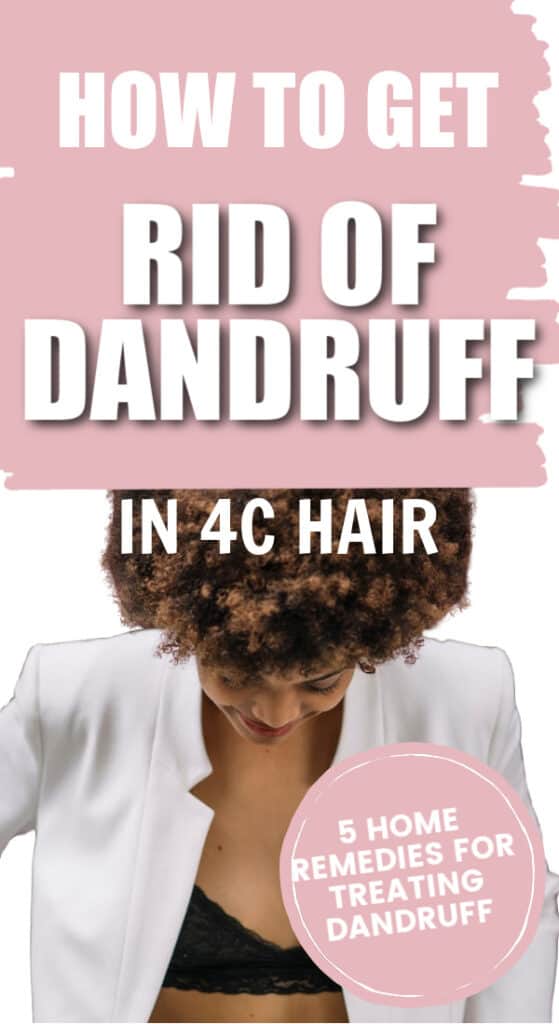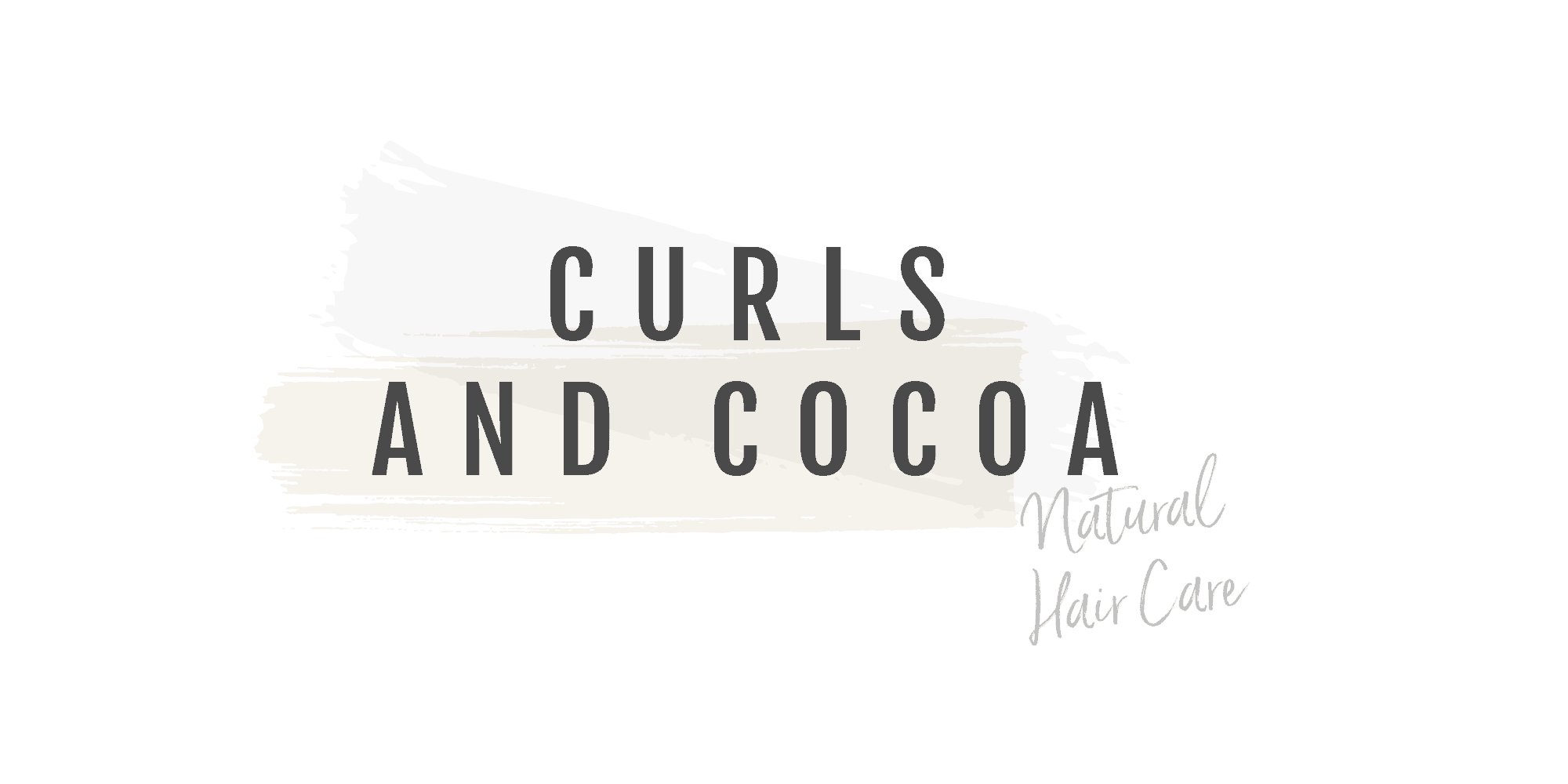Today I want us to talk about the issue of dandruff in 4c hair.
Dandruff is one of those annoying things that some of us have to deal with. It can be very embarrassing when both you and other people can see these white flakes sitting on both your hair and scalp.
In today’s article, we are going to be discussing how to get rid of dandruff in 4C natural African hair, what dandruff actually is, what causes dandruff in 4C natural hair and the best shampoos to use to help treat dandruff.
***Please note that this site uses affiliate links if you would like to read the legal stuff you can find it here

What is Dandruff?
Dandruff is a condition that affects all types of people with all different types of hair texture. It’s possible to experience it to different degrees.
Some people have extreme flareups of dandruff and some people have it not as severe.
It is an overgrowth of yeast on the scalp also called Malassezia fungus. It is not contagious at all.
People with 4C hair may experience it more often just because their hair is more prone to dryness. We’ll explore this a little more further down.
What Are The Symptoms of Dandruff?
The symptoms of dandruff can vary slightly from person to person, some people experience heavy dandruff with a lot of uncomfortable symptoms and others not so much.
The most obvious symptom of dandruff is the white flakes that appear in your hair that can be either noticeable to only you or to you and others. In extreme cases, the flakes can begin to fall from your hair onto your shoulders and over your clothes.
Sometimes you may experience itching or redness of the scalp too.
What Causes Dandruff in 4C Hair?
There are a few possible reasons that you could experience dandruff. Below are some of the most common ones. Let’s take a closer look at those.
1. Reaction To The Products You Are Using
When choosing products for our hair we need to be mindful about the ingredients we are using. There may be things in there that can trigger a flare-up of dandruff and this might not be immediately noticeable to us.
If you are aware that you are sensitive to some ingredients, be mindful of that when choosing products for your hair.
2. Not Caring For Your Scalp Correctly
When people think about hair care they think about the strands of hair. It’s actually very important to consider your scalp too. Your scalp is where the hair comes out of so it would make sense that to be able to correctly care for your hair you would have to care for your scalp too.
You should make sure that your scalp is always free of buildup. You can do this by using a clarifying shampoo such as this one.
You can also implement scalp massages to help with blood flow and oxygen to your scalp. Regular washing of your hair is going to be greatly beneficial to you.
Related post: 7 Tips on how to keep your scalp healthy
3. Dry Skin
As I mentioned before it’s super important to look after your scalp to prevent dryness. You may need to consider adding oils to your hair regimen and massaging those into your scalp.
Remember that your scalp is skin and therefore you need to keep it moisturised and in good condition the same as any other part of your skin.
4. You Have A Yeast Overgrowth
A yeast overgrowth sounds fairly scary but I can assure you it’s not that scary. The bacterial yeast is called Malassezia and it is present on most people’s scalp.
Unfortunately for some people, the growth of yeast can become too much and unbalanced leading to an excess of yeast and ultimately dandruff.
The unbalance can be triggered by a poor diet, hormone imbalance or even stress.
5. Not Washing Your Hair Adequately
Learning how to correctly wash your hair is important. You must always spend time focussing on your scalp as well as the actual hair.
When you cleanse your scalp you give it room to breathe and free it of buildup which can cause your scalp to suffocate.
It’s important to know and understand what your hair likes too and this comes with time. Some people have to wash their hair every week and some can go 2/3 weeks without having to wash their hair. It really depends on how heavy-handed you are with your products, your climate and if your hair produces and lot of sebum or not.
Take the time to study your hair so you can see what it does and does not like.
Related posts: How often should you wash your natural hair
6. Seborrheic Dermatitis
Seborrheic dermatitis causes a reddening and itching of the scalp. It can be very uncomfortable and can be caused by a number of different things.
It can be genetic, caused by excessively oily skin or the overgrowth of yeast.
Some of the other symptoms of seborrheic dermatitis are flaky white or yellow scales which can affect not only your scalp but other areas too such as the groin, eyebrows, armpits and the sides of your nose.

How Do You Get Rid of Dandruff in 4C African Hair?
Fortunately, there are a few things that we can do to either mitigate the chances of experiencing dandruff or help in easing or getting rid of the problem altogether.
6 Things You Can Do To Help Treat Dandruff in 4c Hair
1. Shampoo Regularly
We already touched on this earlier but shampooing your hair can help prevent and treat dandruff. If you are experiencing dandruff issues shampooing regularly but not too often could help.
If you overwash your hair you are likely to wash away your hair’s natural sebum which is a protective barrier for your hair.
2. Use A Clarifying Shampoo
Clarifying shampoo is great for removing buildup in your hair and also on your scalp. It’s great practice to do this once in a while.
Just remember that clarifying shampoo is not something that should be used in replacement of regular shampoo due to its harsh cleansing properties.
Related post: How to clarify your hair efficiently
3. Exfoliate / Massage Your Scalp
Massaging your scalp whilst washing your hair is a great way to exfoliate and free your hair and scalp. There are some great tools that you can use to help you do this too.
4. Keep The pH of Your Hair Balanced
Having balance on your scalp is important. When your scalp is pH unbalanced it causes issues such as dandruff, oily hair and even dull-looking hair.
Your scalp should be as close to pH 5.5 as possible.
Natural remedies such as apple cider vinegar or lemon can help you with this.
5. Moisturise Your Hair and Scalp
Moisture is certainly always the key when it comes to natural hair, especially 4c natural hair which is more prone to dryness.
You may need to incorporate more moisturising days or tighten up your weekly routine to ensure that your hair remains at a level of moisture that works for you.
Get yourself a good leave-in conditioner such as this one and oil you can use on your scalp such as jojoba oil.
Related post: Can you over-moisturise your natural hair?
6. Maintain A Healthy Lifestyle
Maintaining a healthy life is KEY to everything that happens within your body. Your hair is no different. Cutting back on sugary foods and incorporating more fruit and vegetables will take you a long way.
Taking a walk every now and again will also help you to clear your mind, reducing stress and helping your body gain oxygen and be in peak condition.
Don’t forget to sleep well too!
2. Nizoral Anti-Dandruff Shampoo
4. SheaMoisture Hair Care System Anti-Dandruff Shampoo
Home Remedies For Treating Dandruff in 4c Natural Hair
Here are some home remedies that you can use yourself at home to help get rid of dandruff in African hair.
1. Coconut Oil
Coconut oil is a great oil for natural hair. To use this oil simply pour some into the palms of your hands and begin massaging your scalp.
You can either choose to leave it there like that or coat your whole hair and scalp using it as a pre-poo treatment and then wash it off afterwards.
Coconut oil has great anti-fungal properties so this may be a great treatment for you if your hair likes coconut oil.
Not everyone’s hair is necessarily receptive to coconut oil so keep that in mind.
2. Aloe Vera
Aloe vera is another great at home remedy for dandruff. Simply cut the leaf of a plant, slice it in half to remove the inside jelly part and rub that into your scalp.
Leave it on for a few minutes before washing off with a shampoo and conditioner.
If you don’t have an aloe vera plant you can always buy aloe vera gel here.
Aloe vera has perfect anti-bacterial and anti-fungal properties.
Related post: Why aloe vera is great for natural hair
3. Apple Cider Vinegar
Apple cider vinegar is very easy to use on your scalp. Simply mix it in part with water and apply it to your scalp either before or during your wash.
Apple cider vinegar is known for helping to balance the pH levels of your hair, preventing dandruff and other scalp issues.
4. Baking Soda
Baking Soda is known for treating fungal problems. You can this to your shampoo and rub it into your hair and scalp.
Baking soda can be a little harsh on natural hair so I would recommend that you use it sparingly.
5. Tea Tree Oil
Tea tree oil has great antifungal and anti-inflammatory properties. Using this oil once in a while on your scalp can help to soothe and moisturise your scalp.
What’s The Difference Between Dandruff And A Dry Scalp?
Most people would have you believe that dandruff and dry skin are the same thing but really they are not. Dandruff is usually a fungal infection which causes the scalp to flake. Whereas dry scalp is due to not enough moisture. A dry scalp can easily be corrected by using the appropriate hair products and making sure your hair does not get dry.
Related post: What’s the best moisture for natural hair?
How To Get Rid of Dandruff Permanently
We have already seen the various options that we can use to get rid of dandruff in 4c hair. To get rid of dandruff permanently we need to make sure that we are taking active steps so that it does not return.
Using dandruff shampoos that contain zinc pyrithione and selinium sulfide will help as well as making sure that we shampoo our hair regularly and not just co-wash alone.
If you want to know why you shouldn’t just co-wash alone you can check out my other article here.
Final Thoughts on How To Get Rid of Dandruff in 4c Natural Hair
As you can see from above dandruff certainly is annoying but it is at least manageable and in some cases fully treatable.
It’s important to remember to take care of your scalp just as much as you would your hair. A healthy scalp means healthy hair too.
If you want to learn more about dandruff and how to avoid it check out my other articles listed here:
Posts related to dandruff in 4C hair:
7 Natural remedies to treat dandruff
7 Tips to help you keep your scalp healthy
Itchy scalp remedies for black hair










